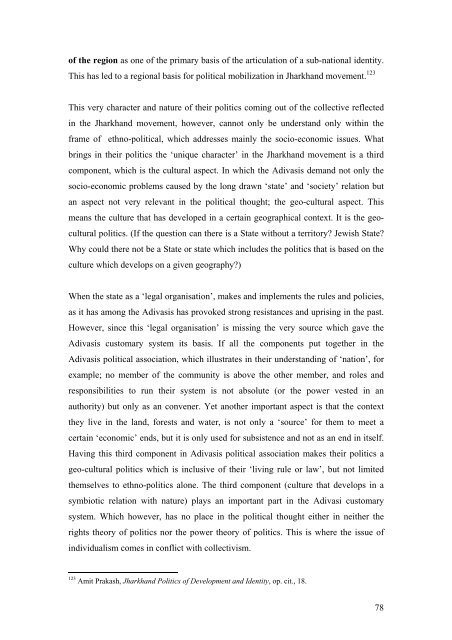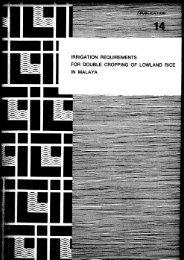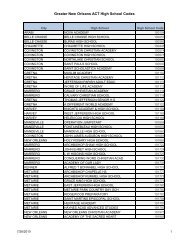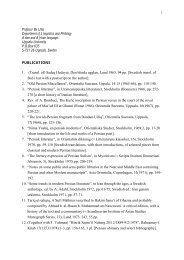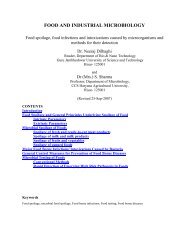On the Future of Indigenous Traditions - Munin
On the Future of Indigenous Traditions - Munin
On the Future of Indigenous Traditions - Munin
You also want an ePaper? Increase the reach of your titles
YUMPU automatically turns print PDFs into web optimized ePapers that Google loves.
<strong>of</strong> <strong>the</strong> region as one <strong>of</strong> <strong>the</strong> primary basis <strong>of</strong> <strong>the</strong> articulation <strong>of</strong> a sub-national identity.<br />
This has led to a regional basis for political mobilization in Jharkhand movement. 123<br />
This very character and nature <strong>of</strong> <strong>the</strong>ir politics coming out <strong>of</strong> <strong>the</strong> collective reflected<br />
in <strong>the</strong> Jharkhand movement, however, cannot only be understand only within <strong>the</strong><br />
frame <strong>of</strong> ethno-political, which addresses mainly <strong>the</strong> socio-economic issues. What<br />
brings in <strong>the</strong>ir politics <strong>the</strong> ‘unique character’ in <strong>the</strong> Jharkhand movement is a third<br />
component, which is <strong>the</strong> cultural aspect. In which <strong>the</strong> Adivasis demand not only <strong>the</strong><br />
socio-economic problems caused by <strong>the</strong> long drawn ‘state’ and ‘society’ relation but<br />
an aspect not very relevant in <strong>the</strong> political thought; <strong>the</strong> geo-cultural aspect. This<br />
means <strong>the</strong> culture that has developed in a certain geographical context. It is <strong>the</strong> geocultural<br />
politics. (If <strong>the</strong> question can <strong>the</strong>re is a State without a territory? Jewish State?<br />
Why could <strong>the</strong>re not be a State or state which includes <strong>the</strong> politics that is based on <strong>the</strong><br />
culture which develops on a given geography?)<br />
When <strong>the</strong> state as a ‘legal organisation’, makes and implements <strong>the</strong> rules and policies,<br />
as it has among <strong>the</strong> Adivasis has provoked strong resistances and uprising in <strong>the</strong> past.<br />
However, since this ‘legal organisation’ is missing <strong>the</strong> very source which gave <strong>the</strong><br />
Adivasis customary system its basis. If all <strong>the</strong> components put toge<strong>the</strong>r in <strong>the</strong><br />
Adivasis political association, which illustrates in <strong>the</strong>ir understanding <strong>of</strong> ‘nation’, for<br />
example; no member <strong>of</strong> <strong>the</strong> community is above <strong>the</strong> o<strong>the</strong>r member, and roles and<br />
responsibilities to run <strong>the</strong>ir system is not absolute (or <strong>the</strong> power vested in an<br />
authority) but only as an convener. Yet ano<strong>the</strong>r important aspect is that <strong>the</strong> context<br />
<strong>the</strong>y live in <strong>the</strong> land, forests and water, is not only a ‘source’ for <strong>the</strong>m to meet a<br />
certain ‘economic’ ends, but it is only used for subsistence and not as an end in itself.<br />
Having this third component in Adivasis political association makes <strong>the</strong>ir politics a<br />
geo-cultural politics which is inclusive <strong>of</strong> <strong>the</strong>ir ‘living rule or law’, but not limited<br />
<strong>the</strong>mselves to ethno-politics alone. The third component (culture that develops in a<br />
symbiotic relation with nature) plays an important part in <strong>the</strong> Adivasi customary<br />
system. Which however, has no place in <strong>the</strong> political thought ei<strong>the</strong>r in nei<strong>the</strong>r <strong>the</strong><br />
rights <strong>the</strong>ory <strong>of</strong> politics nor <strong>the</strong> power <strong>the</strong>ory <strong>of</strong> politics. This is where <strong>the</strong> issue <strong>of</strong><br />
individualism comes in conflict with collectivism.<br />
123 Amit Prakash, Jharkhand Politics <strong>of</strong> Development and Identity, op. cit., 18.<br />
78


